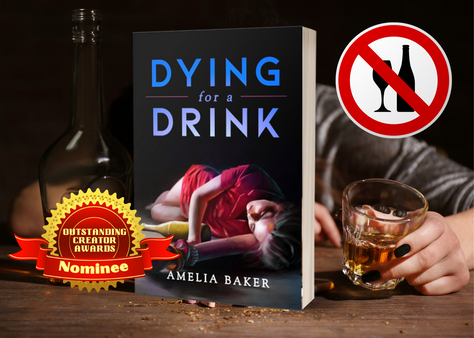|
Score: 93/100 (9.3 out of 10)
“Dying for a Drink” is a terrific memoir/autobiography by Amelia Baker reflecting on her relatable battle with alcoholism, a battle that has lasted for over a decade. Interestingly, this is one of two books on the topic in this contest along with “Make it a Double” by Randall McNair. “The Prodigal Father” by Forrest Hutter, a 2nd-place grand-prize winner in non-fiction, also heavily concerned alcoholism and Alcoholics Anonymous. That gives us some great points of reference and comparison. The fact that we've seen so many books about this one topic is also an indication that alcoholism is a huge problem that affects many lives. There are still a lot of people crying for help and longing for hope. All in all, “Dying for a Drink” distinctly takes a more serious and optimistic tone at the topic than “Make it a Double”—which more so seemed to poke fun and be playful regarding it, not without reason. Sometimes you need to thumb your nose at your problems and your fears. Sometimes, you need to confront the monster in the closet with a laugh and a sneer. Whether that makes it more entertaining or enjoyable to read is arguable and depends on taste, however in our opinion, “Dying for a Drink” is generally more up our alley. The reason for that is that Amelia Baker as a person/character really seems like someone we can get behind and root for. Where as McNair could come across as mean-spirited at times, sometimes even resorting to and glamorizing violence, Baker comes across as someone ridden with guilt and desperately trying to do the right thing. That's not to say that we need the narrator to be a littlest, purest angel. The opposite is true. In Hutter's work, the alcoholic father in question was abusive to the point of being uncomfortable to read about, but it wasn't abuse for the sake of abuse—he seemed to want his son to learn to be strong and independent so that he could take care of himself and his sister, which his son eventually did with great success. That doesn't excuse the narrator's actions, but it makes it more understandable. The obstacle that McNair came across was trying to put across his personal character in the form of poetry—poetry which was often sharp, cynical, and blunt, almost to the point of saying “screw it all." That's in contrast to Baker who is constantly conscientious—constantly considering her actions and inactions—her concealment and neglect—the repercussions of these things on her family and other loved ones. She knows at seemingly all times whether or not her actions are wrong. She knows that she is her own worst enemy, and that a lot of the problems in her life like her son being born with an illness, her divorce, her abuse from a similarly alcoholic partner, falls, and accidents all followed her alcoholism. But like a truly abusive relationship, she kept going back to it for more. The alcohol begins giving her health problems like a distinct “alcohol diarrhea” which features both tragically and humorously in this book as the character puts off cleaning herself after an occurrence in order to go upstairs and drink more alcohol. She also has frequent blackouts and develops obsessive-compulsive as well as secretive behavior. It takes a physical toll on her like a fall that breaks her clavicle. And, of course, the mental/psychological toll is severe. Furthermore, these problems snowball as they lead to such problems as a codeine addiction that bring her to the verge of overdosing. This all leads to suicidal idealization culminating in a suicide attempt. At one point, the narrator's alcoholic behavior gets them barred from her nephew's wedding, a wedding which they'd planned for and hoped on for months. It destroys her relationships. You don't have to be an alcoholic to relate to this book or Baker. Anyone who has struggled with addiction of any kind can relate to this book. Addiction isn't merely a blue-collar problem. It's not just something that affects the poor or those predisposed to having “issues.” It can affect literally anyone, even someone affluent with a good home and a loving family, and that's something that definitely comes across in this book. And addiction doesn't only have to be to alcohol or drugs, you can have other addictions—to eating, to pornography, to shopping, to gambling, or even to diet and exercise (leading to bulimia and/or anorexia). Addiction takes many shapes and comes in many forms, but the affects are similar and familiar. Something we love about this book is that not only does it present a narrative, it also provides support and advice. This is also something we absolutely loved about “A (True) Traumatic Brain History” by Mark Allen in the last contest. Amelia Baker seems genuinely interested in helping people and giving people an example to follow if they are struggling with addiction. Yes, some of these ideas are borrowed from Alcoholics Anonymous or similar programs/books, but they are no less helpful. It's one thing when Bill Belichick tells you how to throw, it's another thing when Tom Brady tells you how to throw. Both are experts, but one has genuine first-hand, recent experience with the process, and is also prolific at it. Similarly, hearing from Baker and learning from her is extremely valuable. Check out this book on Amazon!
0 Comments
Leave a Reply. |
Archives
July 2024
Categories |

 RSS Feed
RSS Feed